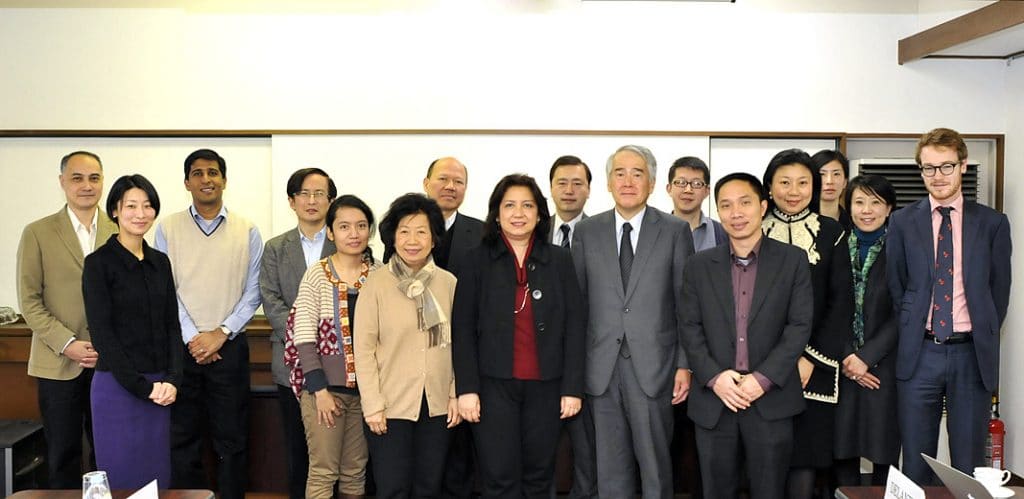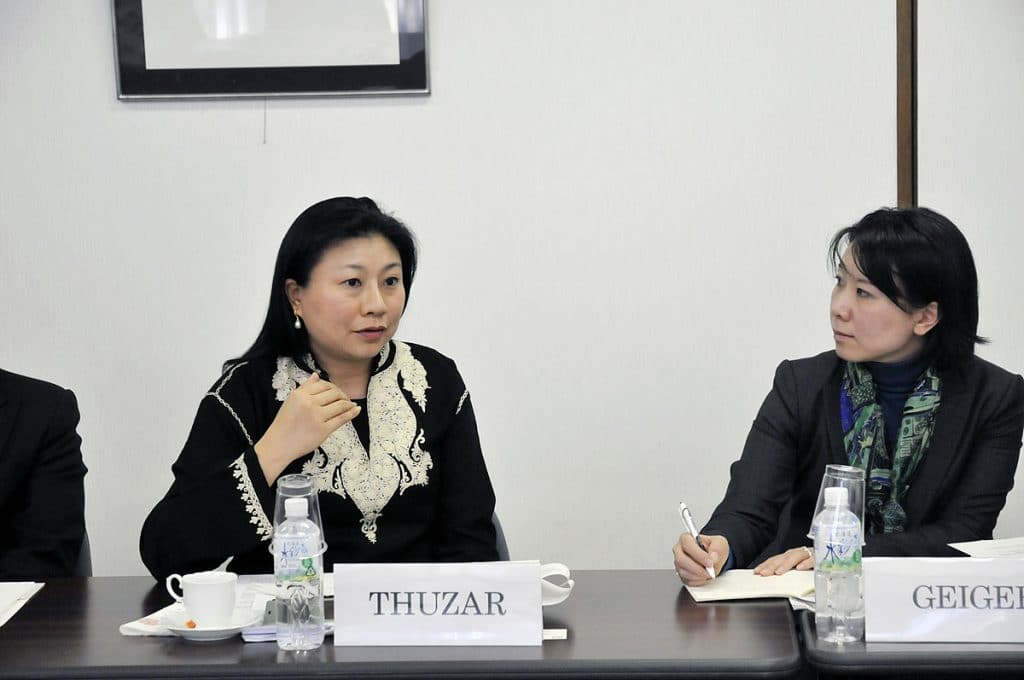The UN estimates that there were 71 million international migrants in Asia in 2013. As globalization and regional ties in East Asia have progressed, a critical question has arisen: How can nations manage the movements of people in such a way that ensures individual, national, and regional security and prosperity? And what role does civil society have to play in that process?
These were the questions being examined by a multinational group of researchers this week who met in Tokyo as part of a JCIE project on the Movement of People in East Asia and the Role of Civil Society, which was supported by the John D. and Catherine T. MacArthur Foundation. This was the group’s second meeting, and they were discussing their draft papers, which are to be published in a book this summer.
Migration is an indispensable part of the economic integration and demographic changes occurring in this region. In addition to the natural flow of people, migration—if it is effectively managed—can be a policy option for nations seeking to eliminate mismatches between demand and supply in the labor market.
At this meeting, project members noted that the movements of people should be managed throughout the spectrum of the various types of cross-border activities—including smuggling, trafficking, and labor migration—under the concept of “safe migration.” They noted that NGOs and other civil society organizations are playing a critical role by raising public awareness of the issues pertaining to migration—including awareness of the rights and obligations of migrants—providing social and legal services, conducting policy research and advocacy from the perspective of human rights and human security, and so on. However NGOs face tremendous challenges, including a lack of resources and a lack of coordination between the sending and receiving countries.
In order to keep migration issues high on the policy agenda and to attract attention and resources, those working on migration need to capitalize on the post-MDG discussions and think about more integrated and comprehensive responses to migration, bringing in sectoral issues such as health and business to the discussion of migration and engaging various stakeholders in the discussion.

February 1
China
Fangmeng Tian, Beijing Normal University
Comments: Yasushi Iguchi, Kwansei Gakuin University
Indonesia
Avyanthi Azis, University of Indonesia
Comments: Supang Chantavanich, Chulalongkorn University
Myanmar
Moe Thuzar, Institute of Southeast Asian Studies, Singapore
Comments: Supang Chantavanich
Philippines
Jorge V. Tigno, University of the Philippines
Comments: Supang Chantavanich
Vietnam
Nguyen Thanh Liem, Institute for Population, Health and Development, Vietnam
Japan
Toshihiro Menju, JCIE/Japan
Comments: Yasushi Iguchi
Korea
Hye Jin Lee, JCIE/Japan
Comments: Yasushi Iguchi
Singapore
Mathew Mathews, Institute of Policy Studies, Lee Kuan Yew School of Public Policy
Comments: Yasushi Iguchi
February 2
Roundtable on possible regional strategy for people-centered approach to managing movement of people—roles of civil society and collaboration with other sectors
Moderator:
Mely Caballero-Anthony, Centre for Non-Traditional Security Studies, RSIS, Nanyang Technological University
Regional Initiatives:
Atsuko Yokobori Geiger, Director of Operations, JCIE/USA
Comments:
William Barriga, Mission Chief, IOM Tokyo Country Office
Supang Chantavanich
Yasushi Iguchi
Guests | |
William Barriga | Mission Chief, IOM Tokyo Country Office (only Monday meeting) |
Supang Chantavanich | Director, Asian Research Center for Migration, Institute of Asian Studies, Chulalongkorn University, Thailand |
Yasushi Iguchi | Professor, School of Economics, Kwansei Gakuin University, Japan |
Research Team | |
Co-directors | |
Mely Caballero-Anthony | Associate Professor and Head of the Centre for Non-Traditional Security (NTS) Studies, S. Rajaratnam School of International Studies (RSIS), Nanyang Technological University, Singapore |
Toshihiro Menju | Managing Director and Chief Program Officer, Japan Center for International Exchange (JCIE) |
Alphabetical Order | |
Avyanthi Azis | Lecturer, Department of International Relations, University of Indonesia |
Hye Jin Lee | Program Associate, JCIE |
Mathew Mathews | Senior Research Fellow, Institute of Policy Studies, Lee Kuan Yew School of Public Policy, National University of Singapore |
Nguyen Thanh Liem | Deputy Director, Institute for Population, Health and Development, Vietnam |
Moe Thuzar | Lead Researcher (socio-cultural), ASEAN Studies Centre ISEAS Fellow, Myanmar Studies Programme, Institute of Southeast Asian Studies, Singapore |
Fangmeng Tian | Assistant Professor, School of Social Development and Public Policy, Beijing Normal University, China |
Jorge V. Tigno | Associate Professor and Chair, Department of Political Science, University of the Philippines |
Atsuko Yokobori Geiger | Director of Operations, JCIE/USA |
JCIE | |
Akio Okawara | President and CEO, JCIE |
Hideko Katsumata | Executive Director and COO, JCIE |
Tomoko Suzuki | Senior Program Officer, JCIE |
Marcel Delany | Intern, JCIE |

